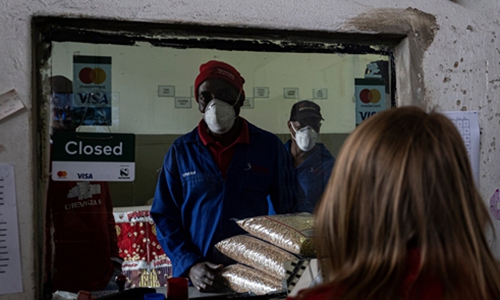HOME >> OPINION
Africa’s limitations make pandemic help an urgent necessity
By Zhu Weidong Source:Global Times Published: 2020/4/10 0:18:40

Employees at a Feeds and Seeds shop wear face masks as a protective measure in Johannesburg, South Africa on March 17. African countries have been among the last to be hit by the global COVID-19 pandemic, but as cases rise, many nations are now taking strict measures to block the deadly illness. Photo: AFP
The number of confirmed cases of coronavirus on the African continent has reached 11,400, with 574 deaths as of press time. Given Africa's current capacity for disease prevention and treatment, this development is worrying.The main challenges facing African countries in responding to COVID-19 stem from the following aspects:
First, African countries lag behind in economic development, which makes it difficult to provide sufficient investment in response to the epidemic. It is difficult for many African countries to provide the necessary funds to build necessary medical facilities or maintain the required number of medical personnel.
Second, the manufacturing capacity of African countries is weak, and many countries do not have the ability to produce masks, let alone produce virus detection kits or ventilators. This leads to insufficient testing, protection and treatment materials, which may lead to the failure of timely diagnosis of many infected people, thus losing the opportunity to provide effective treatment.
Third, public facilities in African countries are imperfect. Many African cities have slums that lack basic amenities such as public toilets and running water. This makes it difficult to implement preventive measures such as frequent hand washing, allowing the coronavirus virus to spread more easily.
The income and lifestyle of many Africans will also affect the effectiveness of the prevention and control measures taken by the government. Low incomes prevent Africans' ability to get tested for the virus, even when they develop symptoms of COVID-19, which poses a huge potential risk for the spread of the epidemic.
Many Africans have to use their wage the same day they are earned, making it difficult for governments to impose strict, long-term home isolation to limit population movements. Social distancing measures are also difficult to enforce in African countries where participating in gatherings is a cultural norm.
After the end of the Ebola epidemic in West Africa, the African Union attached great importance to epidemic prevention and control and public health work in Africa.
In the wake of the Ebola outbreak, leaders of the bloc decided to set up the Africa Centers for Disease Control and Prevention to coordinate the response of African countries to health challenges. However, judging from the performance of African countries in coping with the coronavirus, their capacity to handle large-scale epidemics has not improved significantly.
This is largely constrained by the level of economic development in Africa. With the rapid spread of COVID-19 in the continent, African countries are increasingly in need of financial, technical, human and material help. United Nations Secretary-General António Guterres has called massive international solidarity necessary to help African countries. Together with three senior officials, Guterres also launched a $2 billion global humanitarian response plan to fund the fight against COVID-19 in the world's poorest countries.
As a good friend of Africa, China has actively extended a helping hand to African countries after it basically put COVID-19 under control domestically. So far, the Chinese government has provided emergency assistance, including medical supplies and technical assistance, to many African countries.
The Chinese government has also organized Chinese experts to hold video conferences with their African counterparts and representatives from more than 20 African countries to share experiences and discuss countermeasures.
Chinese enterprises and social organizations have also played an important role in helping Africa fight the epidemic. They have helped some African countries build, expand or upgrade hospitals and isolation centers, and donated a large amount of anti-epidemic materials and funds to Africa.
Although the current situation of the epidemic in African countries is worrying, it is believed that with the joint efforts of China, Africa and the international community, African countries can withstand this severe test and eventually overcome the epidemic. As Nelson Mandela's famous quote posted on boxes of Chinese donations to Africa goes: "When people are determined, they can overcome anything."
The author is a senior research fellow with the Institute of West Asian and African Studies at the Chinese Academy of Social Sciences. opinion@globaltimes.com.cn
Posted in: VIEWPOINT